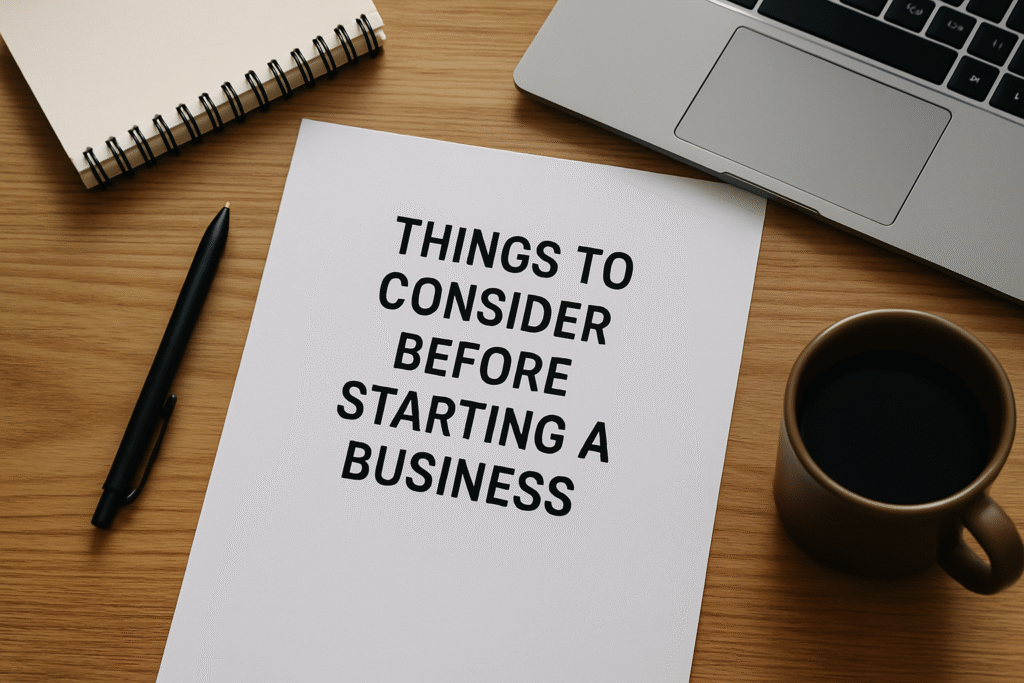Things to Consider Before Starting a Business

Introduction
Starting a business can be one of the most exciting and rewarding decisions in your professional life. But behind every successful venture lies a foundation built on careful planning, smart legal structuring, and strategic thinking. Whether you’re a local entrepreneur or a non-resident looking to enter the U.S. market, understanding the essentials is critical for long-term success.
1. Define Your Business Idea
Every great business starts with a solid idea. But an idea alone isn’t enough. You must evaluate its potential:
- Is there a real market demand?
- What pain point are you solving?
- How scalable is your product or service?
- Is the timing right?
Conduct market research and test your idea with a small audience if possible.
2. Understand Your Target Market
Before you invest time and money, define your ideal customer:
- Age, location, occupation
- Their core needs or problems
- Where and how they spend their money
- Their online behaviors
This will inform everything from branding to marketing strategy.
3. Write a Business Plan
A professional business plan will keep you focused and guide your growth. It should include:
- Executive Summary
- Company Description
- Market Analysis
- Organizational Structure
- Product or Service Details
- Marketing & Sales Strategy
- Financial Projections
This is also essential if you’re seeking funding or partnerships.
4. Choose the Right Business Structure
Your legal structure affects taxation, liability, and even credibility.
Common U.S. Structures:
| Structure | Best For | Taxation Style |
|---|---|---|
| LLC | Small-medium businesses | Pass-through |
| C-Corporation | Startups seeking investment | Double taxation |
| S-Corporation | U.S. citizens with 100 shareholders max | Pass-through |
| Sole Proprietor | Freelancers, low-risk individuals | Personal tax return |
Non-residents usually form LLCs or C-Corps due to fewer restrictions.
5. Starting a Business in the U.S. as a Non-Resident
Many global entrepreneurs choose the U.S. for its economic stability, investor access, and strong legal protections.
Steps for non-residents:
- Choose a state
- Wyoming: low fees, strong privacy
- Delaware: investor-friendly, established
- Florida: good for e-commerce, no state income tax
- Decide on LLC or C-Corp
- Appoint a Registered Agent
- Apply for an EIN (Employer Identification Number)
- Get a U.S. business address or virtual mailbox
- Open a U.S. business bank account
- Stay compliant with annual reports and tax filings
6. Understand Legal and Tax Obligations
Failing to meet legal requirements is one of the fastest ways to damage your brand.
- Business Licenses: Check local, state, and federal requirements.
- Tax Filing: Understand federal, state, and sales tax obligations.
- Annual Reports: Many states require filing yearly to remain in good standing.
- Bookkeeping: Consider professional help to avoid IRS issues.
7. Build Your Digital Presence Early
Your online identity is often the first impression.
- Register a domain name that matches your business
- Create a professional website
- Set up business email accounts
- Establish your brand on social media
- Use tools like Google My Business for visibility
This builds trust, helps with SEO, and attracts early customers.
8. Secure Funding (If Needed)
Depending on your business model, you may need startup capital.
Funding Options:
- Personal savings
- Angel investors or venture capital
- SBA loans (if eligible)
- Crowdfunding (Kickstarter, Indiegogo)
- Grants (for specific industries or founders)
9. Build the Right Team
Even if you’re starting solo, you’ll need reliable help as you grow:
- Accountants
- Legal advisors
- Web developers
- Marketing professionals
- Virtual assistants
Investing in the right people from the start saves time and prevents costly mistakes.
10. Stay Compliant Year-Round
Compliance is not a one-time task. You need to:
- File annual reports
- Keep your business license active
- Track tax deadlines
- Maintain proper records
Consider using a compliance tracking service to stay organized and avoid penalties.
Why the U.S. Is a Top Destination for Entrepreneurs
- Strong legal framework
- Favorable for foreign founders
- Access to global investors
- Large consumer base
- Simple online registration process
You don’t need to live in the U.S. to start a business there. With the right service provider, it can be done remotely and quickly.
How IncState Can Help
At IncState, we provide end-to-end solutions for entrepreneurs worldwide:
- LLC and C-Corporation Formation
- EIN / ITIN Application
- Registered Agent Services
- Virtual Address Setup
- Annual Report Filing
- Compliance Monitoring
- Business Banking Assistance
- Domain and Hosting Services
We make it simple, fast, and affordable — so you can focus on what matters most: growing your business.
Final Thoughts
Starting a business isn’t just about the idea — it’s about execution, compliance, and strategy. If you take the right steps from the beginning, you’ll save time, money, and headaches in the long run.
Whether you’re starting locally or forming a U.S. company from abroad, make sure your foundation is strong, legal, and future-proof.
Ready to Start? Explore our services and take the first step toward launching your dream business — with expert guidance every step of the way.